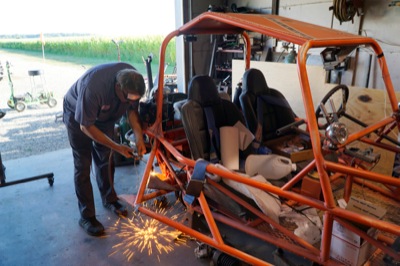Saturday, August 6th, 2016
Hospice program keeps memories close to heart
By Claire Giesige
ST. MARYS - The steady beats behind melodies crafted at Grand Lake Hospice do not come from drums but rather the heartbeats of clients.
The music heartbeat therapy offered by Grand Lake Hospice through Brittany Scheer's Living Music is a way for terminally ill patients to create keepsakes for their loved ones.
"In the music therapy realm of hospice care, we're creating legacies through music," Scheer said.
Scheer uses equipment purchased with Midwest Electric grant money to capture the heartbeats of hospice clients. A recording stethoscope is her main tool.
"It's nice to be able to use the actual recording of life, of your heart," Scheer said. "Everybody has a rhythm."
During music therapy sessions, Scheer helps her patients and their families form ideas of what music means to that person and learns what kind of music they enjoy. Then she works with them to set their heartbeats to songs.
"It brings their music to life, which I think is so rewarding both in the moment and later," she said. "I feel it really keeps the patient, not alive, but it keeps their spirit."
On a CD or digital copy of a song, family members can listen to the steady pumping of their loved ones' hearts after they're gone. Each song starts with only a heartbeat before the melody comes in.
Each person's heartbeat is unique, Scheer said. They can vary in volume, speed and rhythm.
"It keeps their humanity alive," she said. "It's something that is just so strong and it's a part of us, a part of our rhythm."
The songs range from popular tunes to old favorites and can be an artist's recording of the song or the patient singing it, either alone or with his or her family. It's that person's choice, Scheer said.
Songs often have great significance to the patient, such as a younger client who used the first song from their wedding or a patient who chose a special song passed down from mother to daughter.
The recorded song can be an immense comfort in the wake of the patient's passing.
"You always hear, 'I wish I could hear my mom's voice one more time,' " Scheer said. "Now having that heartbeat as a keepsake is, I imagine, pretty powerful."
The therapy is also useful in life, as the recording process is a good bonding experience for the family.
"The family works together. Maybe they're holding the loved one's hand while I'm recording the heartbeat or while we're talking about music. Maybe we're making music together or singing," Scheer said.
While heartbeat music therapy helps patients build their legacy, Scheer said it also helps them cope emotionally with their diagnoses.
"Part of it is allowing the sadness and emotions to come out," she said.
Music therapy in general is a powerful tool, she explained. She said music activates every part of the brain.
"It's so powerful in the emotional context of a brain. That's where it travels first," Scheer said. "It can really help open up things."
As a music therapist, she has been trained in how to use a patient's reaction to music.
It can help with emotional expression, pain management, even sleeping issues.
Terminal patients typically have a lot of pain and anxiety, Scheer said, but their suffering can be as emotional as it is physical.
"Music is one thing that can help tap into that," she said. "Sometimes verbally you can't explore that. Music can be a stronger avenue to explore some of those things without even saying anything."
Grand Lake Hospice Manager Loraine Bernard and coordinator Jane Steinemann said Scheer's services, which started being offered about a year ago, have been received very well.
"It's added such a wonderful layer to our service," Steinemann said. "There's something about the common bond with music that really brings out the emotion, the love in the room, the memories. Patients and families just enjoy that so much."
Bernard explained hospice is there to help terminal patients in any way they can, using a holistic approach. Patients choose what services they think will be helpful and no treatment is mandatory, she said.
The end of life process is a unique journey for every family, Steinemann said.
"It's such a precious time in a family's life, in their time as a family unit. And you get to help make that time so much better," she said.

